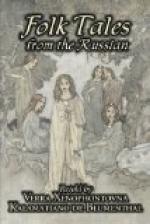The Tsar Pea was sitting on his throne, one brother on his right hand, the other brother on his left hand. The feast was going on; all seemed jolly, all were drinking, all were noisy as bees in a beehive. In the midst of it a young, brave fellow, Ivanoushka the Simpleton, entered the hall—the very fellow who had passed the thirty-two circles and reached the window of the beautiful Tsarevna Baktriana.
When the brothers noticed him, one almost choked himself with wine, the other was suffocating over a piece of swan. They looked at him, opened wide their eyes, and remained silent.
Ivanoushka the Simpleton bowed to his father-in-law and told the story as the story was. He told about the apple tree, the wonderful apple tree with silver leaves and golden apples; he told about the pig, the golden-bristled pig with silver tusks and her twelve little ones; and finally he told about the marvelous mare with a golden mane and diamond hoofs. He finished and laid out ears, fingers, and toes.
[Illustration: “One brother was sent to watch the turkeys”]
“It is the exchange I got,” said Ivanoushka.
Tsar Pea became furious, stamped his feet, ordered the two brothers to be driven away with brooms. One was sent to feed the pigs, another to watch the turkeys. The Tsar seated Ivanoushka beside himself, creating him the highest among the very high.
The feast lasted a very long time until all were tired of feasting.
Ivanoushka took control of the tsarstvo, ruling wisely and severely. After his father-in-law’s death he occupied his place. His subjects liked him; he had many children, and his beautiful Tsaritza Baktriana remained beautiful forever.
WOE BOGOTIR
[Illustration] In a small village—do not ask me where; in Russia, anyway—there lived two brothers; one of them was rich, the other poor. The rich brother had good luck in everything he undertook, was always successful, and had profit out of every venture. The poor brother, in spite of all his trouble and all his work, had none whatever.
The rich brother became still richer, moved into a large town, bought a big house, and was a merchant among merchants. The poor brother became very poor, so poor that very often there was no crust even in the “izba,” the peasant’s log cabin, and the children—all forlorn, miserable little things—cried for food.
The poor man lost patience and complained bitterly of his ill luck. He had no more courage and his head dropped heavily on his breast. One day he decided to call upon his wealthy brother for aid. He went and said to him:
“Be good, help me, for I am almost without strength.”
“Why not?” answered the rich man. “We can do such things as that. There is wealth enough; but look here, there is also plenty of work to be done. Stay around the house for a while and work for me.”




